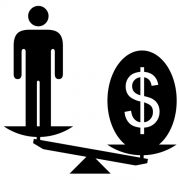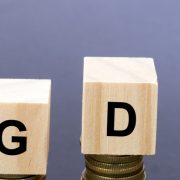West Virginia Senator Robert Byrd died in 2010 as the longest serving U.S. senator of all time. While in office, Byrd predictably amassed enormous power such that he was able to shower West Virginia’s citizenry with all manner of government largess.
Evidence of Byrd’s generosity with the money of others is all over the state. There’s the Robert C. Byrd Highway System, the Robert C. Byrd Bridge, the Robert C. Byrd Expressway, the Robert C. Byrd Federal Building, the Robert C. Byrd Health and Wellness Center, the Robert C. Byrd Institute for Advanced Flexible Manufacturing Systems, along with countless schools, service centers, rest stops on West Virginia highways, etc. Byrd delivered copious amounts of federal spending to the state, but did not deliver prosperity. West Virginia remains one of the U.S.’s poorest states, and is a monument to the flawed thinking popular among pundits, economists and politicians that says government spending boosts economic growth. No, it doesn’t. Wealth and capital goods follow talent, which means tens of billions were consumed in West Virginia only for the proceeds to exit the state as its best and brightest have been doing for decades.
Byrd’s failure to deliver his state from endless stagnation came to mind while reading a recent piece by Atlantic staff writer Derek Thompson. Writing about a Trump economic outlook that he asserts neither side will defend, Thompson claims Republicans don’t want to talk up the economy because they “don’t like to admit the biggest policy-based reason why the economy surged in 2018 and into 2019, which is this: President Donald Trump secured the very stimulus that Republicans spent years denying President Obama.” No, that’s not a serious view.
But then Keynesians don’t even bother to try to be serious anymore. Having had their analyses so thoroughly warped by groupthink for the longest time (Keynes himself, as he neared his own end, referred to his many disciples as “those fools”), they’re no longer capable of constructing reasonable arguments. None dare say it since pundits on both sides increasingly buy into the laughable notion that government consumption powers growth, but Keynesians are the modern flat earthers.
Really, where does one begin? Implicit in Thompson’s thesis is that absent government spending, capital just sits idle. That’s not true, though it’s not Thompson’s fault for not knowing it’s not true. Most economics professors are Keynesians too such that they cheer government consumption of wealth always and everywhere created outside government. Thompson is plainly well taught, and that’s the problem. Again, there’s no such thing as idle wealth or idle money. Banks and brokerages don’t take in unspent wealth only to stare lovingly at it, rather they immediately put it to work. For them to sit on it as Thompson plainly imagines they do (hence his support of government spending to make up for alleged private sector parsimony) would be for them to bring on rapid insolvency. This statement of the obvious rates mention given Thompson’s belief that consumption is the driver of growth. It isn’t, but even if it were, no act of saving – short of stuffing money under a mattress – ever subtracts from or delays consumption. To save is for one to shift consumptive ability to others. Or better yet, to shift resource access (investment) to others with an eye on future returns.
Thompson’s surely well-meaning guess as to what instigates economic growth comes up short, but it’s hard to fault the youthful writer too much for taking extra good notes in class. Academics believe consumption powers economic growth, and by extension so does Thompson. The credentialed (and the journalists who hang on their every word) don’t understand that consumption is what happens after production. Always. Figure that we all have endless consumptive desires, which means no government need consume for us. What limits our consumption isn’t a lack of desire as much as it’s a lack of investment. Investment is what makes it possible for us to produce more and more in less and less time. It’s called productivity. Investment boosts productivity, which is what economic growth is. Consumption doesn’t boost economic growth as Thompson presumes, rather it’s a consequence of it.
But since Thompson believes consumption is the source of output, it’s only natural that he would believe government waste during the Trump years would be the cause of growth. Implicit in what’s absurd is that Nancy Pelosi and Mitch McConnell are better allocators of precious resources than are Peter Thiel and Jeff Bezos. No, that too isn’t serious.
Thompson’s analysis ignores why money is so much more meaningful to progress when in the hands of Bezos: he grows through constant failure. By his own admission, he’s spent many billions on failed ideas. And that’s the point. Bezos is a feverish experimenter with a focus on figuring out what works, but even his failures aren’t problematic. Bezos emerges from them much the wiser. Not so government simply because government never has to realize its blunders.
Government spending, and this includes federal spending, is often relentless spending on what’s already revealed itself as unwise. Basically it’s waste of the West Virginia variety over and over again. Precious resources mis-allocated by politicians who don’t have to abide market discipline. They have taxpayers that they can regularly return to and who face jail time if they don’t hand over their income to them, while private sector players recognize that the supply of capital available to them is the opposite of endless. To keep investing they must allocate resources properly. Not so politicians.
Taking this further, Thompson’s belief that government spending has enhanced modern production would cause the most crooked of accountants to blush. It’s double counting of the most obvious kind. Governments can only spend insofar as the private sector is producing taxable wealth for them to spend. Translated, the economic growth that Thompson thinks results from government spending has in fact already occurred. That’s what enabled the spending. Get it? Implicit in Thompson’s worldview is that government spending in Peru, Haiti and El Salvador is a fraction of what is spent stateside solely because the politicians in those countries are less enlightened, and presumably less Keynesian. No, economic growth is slight in each country which means tax receipts and the ability to borrow against future tax receipts is highly limited because of a lack of economic growth. Though he aimed to make a bigger – and correct – point about how full of it both sides are, Thompson’s attempt at correlation is entirely backwards.
To believe his analysis, the former Soviet Union ran out of resources to support its bankrupt regime because it didn’t boost the economy enough with lavish spending. Actually, the collectivist policies were the reason Soviet officialdom had so little to spend. Readers get the picture. Thompson eventually will.
In Thompson’s defense, many Republicans (this likely includes the occupant of the White House) believe as he does that government spending is the spark that ignites economic growth. No, government spending is an effect of growth. Thompson put pen to paper with an eye on getting in a clever dig at the Trump economy, but all he really succeeded in doing was to remind the mildly sapient that Keynesians are the flat-earthers of modern times.













